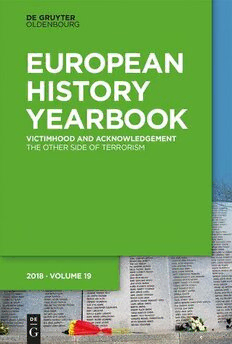
Victimhood and Acknowledgement: The Other Side of Terrorism PDF
02018·14.347 MB·English
Most books are stored in the elastic cloud where traffic is expensive. For this reason, we have a limit on daily download.
Preview Victimhood and Acknowledgement: The Other Side of Terrorism
Description:
The history of terrorism has been largely a history of perpetrators, their motives and actions. The history of their victims has always seemed to be of secondary importance. But terrorism is communication by violence, and its efficiency depends significantly on the selection and the treatment of the victims by the perpetrators, on the one hand, and the perception and acknowledgement of victimhood by the public, on the other. How does it affect our picture of the history of terrorism then, if the victims are moved centre stage? If the focus is put on their suffering, their agency, their helplessness, or on how they are acknowledged or exploited by society, politics and media? If the central role is taken into account which they play in terrorist propaganda as well as in the emotional response of the public? The contributions to this edition of the European History Yearbook will examine such questions in a broad range of historical case studies and methods, including visual history. Not least, they aim at historicizing the roles of survivors and relatives in the social process of coming to terms with terrorist violence, a question highly relevant up to the present day.
See more
The list of books you might like
Most books are stored in the elastic cloud where traffic is expensive. For this reason, we have a limit on daily download.
